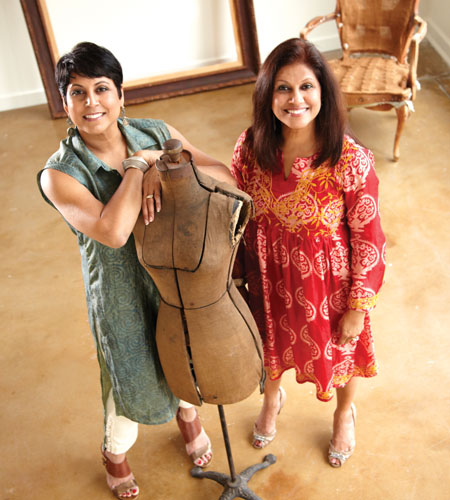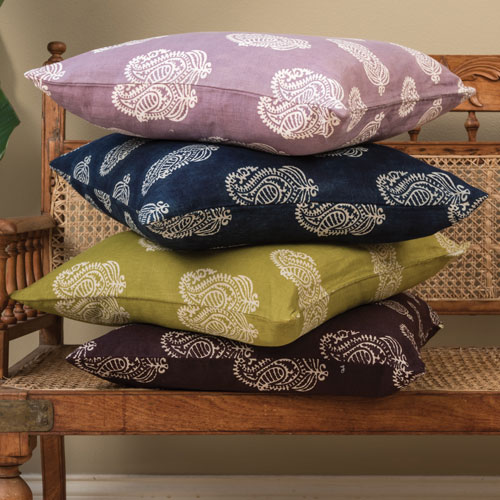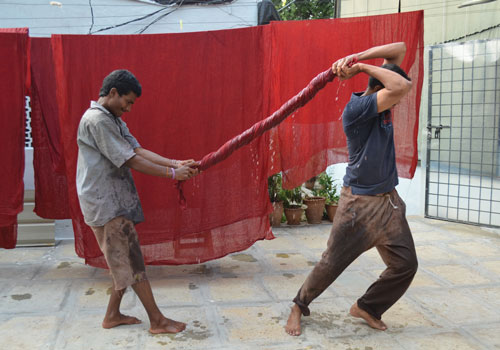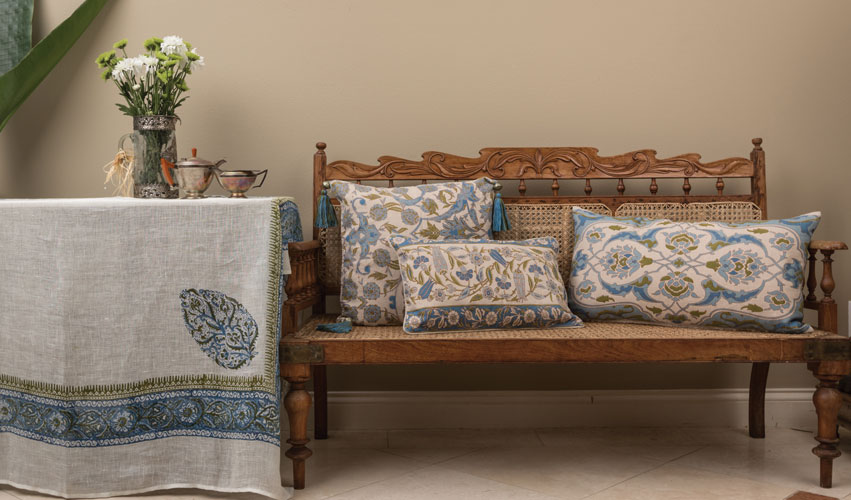Alamwar is a textile producer, a style influencer, and a story of preservation amidst progress.
When a distant aunt was preparing to close the printing shop she ran in Hyderabad, India, Viji Reddy stepped in. Having developed a love and skill for textiles under the tutelage of the shop’s master artisans, Viji took over the business, embarking on a venture that balances preservation with evolution.
She rebranded the print shop with a family name and soon brought her sister, Archi Reddy, on board as chief financial officer. The two sisters have since built a business with a triple bottom line that’s socially aware, environmentally conscious and financially rewarding.
Today, Alamwar’s sustainable fashions are designed with ecological materials by traditional artisans who are paid a fair wage for their work. The family shop has grown from two printers, whose designs were limited to whatever customers brought to them, to six printers who design custom textiles to be sold around the world.

Archi Reddy, Alamwar CFO, with her sister, Viji Reddy, company founder and president
A Home in Peoria
While Alamwar’s production still takes place in Hyderabad, it is by happy chance that Peoria can call itself home to the Alamwar warehouse and U.S.-based operations. “We actually picked to come here,” Archi says. When her husband, a physician, was completing his studies in Iowa, they would often drive to visit relatives in Indiana. “We kept driving through Peoria and thought this is maybe a good place to be,” she recalls. “And we’ve been here since ’95.”
The company has since grown to fill a warehouse on the north side of town, directly beneath the medical office of Archi’s husband, Dr. Chittaranjan V. Reddy. Because the sisters are often working from India or attending trade shows throughout the states, the Peoria warehouse functions as a respite from travel, a pit stop in which to reorganize, and a home base for inventory that’s shipped to retailers throughout the country.
The warehouse shelves are filled with ornate and colorful home goods and apparel, but Archi explains the designs that sell in India aren’t necessarily well received by U.S. customers. Some of the traditional floral patterns must be toned down with colors that appeal more to the American palette. Every season, the sisters fine-tune a new line of products, which find a home on these shelves.
“I’m the one who says the price is too high, or this is what we can afford to carry,” Archi says. “[My sister] is the one who wants the sun, moon and earth because she is the artist, and she cannot detach herself from that.” At peace with their complementary roles, Archi claims to be the biggest fan of her sister’s designs, adding that she wouldn’t want to run the business with anyone else.
 Artisan Craftsmanship
Artisan Craftsmanship
Archi spends much of her time planning for and attending trade shows, where she meets the buyers who source Alamwar products for their retail locations. New York Now is the largest home show in the country, and the Reddys participate in it every January and August. This is where they get to tell Alamwar’s story of craftsmanship.
“It’s such a commercialized [market]; everyone is looking for the cheapest product. Our product is something that you buy, you cherish and you hand down,” says Archi. The focus is on small batches, slow movement and intentional sourcing. It’s important to share that story with buyers, she says, because “as you go into fast-paced production, you lose the essence of the beauty of the creation, and the people who actually make the products are lost.”
Preserving the craft and dignity of artisans is at the heart of Alamwar, and that is what Archi finds most satisfying about running the business. “Anything you can do directly with artisans or weavers makes a huge impact in their lives,” she explains, “because the money isn’t going to a middleman.” They source as much fabric and dye as they can from small families of weavers and farmers. Staying as close to the source as possible while filling orders for international retailers is just one way the sisters gracefully walk the line between conservation and growth.
While the all-natural dyes used by Alamwar cost about eight times more than common, petroleum-based dyes, they preserve the traditional craft and are much better for the environment. They also allow the Reddys to steer clear of the chemical odors present in fabrics colored with synthetic dyes. Because natural dyes won’t adhere to synthetic fabrics, the sisters have diligently sought out different types of 100-percent pure fabrics, including a favorite material called khadi.
Khadi is a hand-spun, hand-woven cloth made from cotton that gained popularity in India during a boycott against British textiles. As a nonviolent form of protest, Gandhi took up weaving in order to avoid buying the fabrics that were made in Indian mills, shipped to Britain, and then sold back to Indians at a large margin. “We try to use [khadi] as much as we can, because it is a way of living for a lot of people in the villages,” Archi explains. The popularity of homemade khadi led the spinning wheel to become the symbolic image of Gandhi’s Indian independence movement.
Attention to sourcing goes beyond materials for the Reddys, who also work with indigenous women who have mastered the art of embroidery. Once a textile has been woven and dyed, Alamwar sends it to the Self-Employed Women's Association (SEWA), a trade union that helps self-employed female workers reach financial independence. “SEWA has evolved into this fabulous machine run by women, with their own banks and hospitals,” says Archi. She loves being able to partner with rural women who grew up perfecting their crafts, and the sisters find themselves constantly asking, “How can we have more avenues to find more artisans like this?”

Artisan printers in Hyderabad, India wring out excess water while processing fabric at the mill. Preserving the craft and dignity of artisans is at the heart of Alamwar’s business model.
The Art of Balance
Incorporating social awareness into the business’ bottom line does come with its own set of challenges. Recently, for example, an embroidery order arrived at the warehouse with brown spots on the fabric. Archi and her team figured out it was dirt that came from working on the ground of rural homesteads, as most women associated with SEWA do. This doesn’t discourage the Reddys, but it does illustrate the need for additional communication regarding their standards for processing orders.
Clear communication is also necessary to explain to customers that when using natural dyes, not every item will match to perfection. A set of indigo tunics might be a slightly different hue than the last order, due to the levels of sunlight when weaving, the way the fabric was steamed, or how the indigo was farmed.
It takes the warehouse manager, Jo, who has been quietly tapping out emails at her desk, to reveal another key element of Alamwar’s business culture. “They’ve never really subscribed to the train of thought… that schooling equals education,” she chimes in. “In an artistic community, that’s not always the case.”
Archi nods, immediately reminded of Alamwar’s master textile cutter, who can’t read or write his name, so signs his work with a thumbprint; their print shop manager in Hyderabad, who has a fifth-grade level of formal schooling; and another assistant, who completed the seventh grade. Excitedly, she thanks Jo for the observation. “I never thought of it that way; that’s pretty cool!”
Archi goes on to lament that she can’t hire more young adults locally who need sustainable work. She strongly believes supporting local businesses that are invested in their community is one of the most important ways we can make an impact as consumers. If Alamwar does grow its operations in the Peoria area, she hopes to continue offering work to people who prove they’re willing to learn, whether or not they have a degree. The Reddys do have hopes to create more opportunities for Peorians to shop their collections. They envision open warehouse weeks where locals can peruse the inventory, and recently launched a new website merging wholesale and retail options.

From decorative pillows to duvets, bedspreads and quilts, Alamwar Home Collections are created from a range of fine cotton, linen and blends, manually block-printed and screen-printed in India.
As for the company’s international growth, Alamwar is in the process of opening a new retail shop in India, and is currently relocating the print shop to a farm outside the city. Surrounded by mango and coconut orchards, the new location will serve as a retreat center and workshop where people can balance the rush of city life with time away, connecting to an ancient art.
On top of mastering the art of printed textiles, the Reddy sisters have become skilled at the art of balance. Viji’s creative drive is balanced by Archi’s business sense; the preservation of a family craft is balanced by its progression into world markets; human capital investments are steadied by a deep sense of dedication to their employees’ well-being. In each of these ways, Alamwar is putting much more than beautiful textiles into the world. iBi
Visit aalamwaar.com to learn more about Alamwar Textiles and its unique line of hand-crafted natural fabrics.


